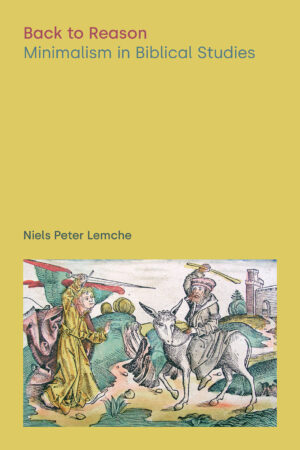
The Society of Biblical Literature recently reviewed Back to Reason: Minimalism in Biblical Studied by Niels Peter Lemche. According to reviewer Susanne Scholz:
To him, the historical-literary situation is obvious and undisputable. The Hebrew Bible is Hellenistic literature.
Several chapters of the book target scholars who have participated in the minimalist/maximalist debate. Simply based on the excerpts in the book review, one readily ascertains that the debate was quite heated and at times highly personal. But such acrimony is not the purpose of this blog.
According to the book review, Lemche acknowledges that other minimalists such as Philip R. Davies suggest the Persian period as the time of writing. Whether or not Lemche analyzes why some scholars designate the Persian period while he does the Hellenistic is not stated in the review. It would be interesting to know what the criteria for differentiating a Hellenistic origin from a Persian period origin are.
Also according to the book review, a similar scenario occurs with the Exilic period. Here Lemche notes the work of John Van Seters. Again it would be useful to know the diagnostics for differentiating Exilic, Persian, and Hellensitic writing. Perhaps Lemche does in the book but one cannot tell from the book review.
Earlier periods in time also have their champions. Whether or not they are mentioned in the book cannot be determined from the review. For example, Frank Moore Cross and his students are closely associated with writing in the time of Josiah. In fact, Josiah earns a pre- and post-Josiah selection. There are writings which occurred while Josiah was still alive and the writer was optimistic. Then there was the writing after death of Josiah and there was a need to explain why history had not worked out as prophesized.
Lately, there has been new and even earlier addition to the time frame selected for Hebrew Bible writing. Israel Finkelstein and Thomas Römer champion the reign of Jeroboam II. Based on the archaeology, they posit that the successful reign of this king was the time, or a time, of biblical writing. Finkelstein in particular has churned out article after article about patriarch after patriarch to show that the successful reign of Jeroboam II was the time of origin for these stories.
The sequence can be pushed back even further. Antony Campbell has posited a prophetic stratum for the writing of the Hebrew Bible roughly from Ahijah to Elijah created from the Elisha circle of prophets. He then has suggested a multitude of levels for such writings from Deuteronomy to II Kings. He even has identified by chapter and verse the anonymous writers who authored the different strands. So we are dealing here not with one person at one time who is the author, but multiple people over extended time and with different points of view.
The process of writing the Hebrew Bible can be pushed back even further before Ahijah and the divided kingdom. Gerhard von Rad thought of the Solomonic kingdom as a time of enlightenment that dazzled the world as they knew it. Truly such writing was a golden age for the writing of the Hebrew Bible.
The story can be pushed back another generation. The reign of King David also has its champions such as Kyle McCarter among others. In this situation, the writer as in the time of Solomon is writing about events in the present including David’s Rise to Power, the Court History, and the Succession. Of course, these writers of the 10th century had much less to write about then subsequent writers. But it is easy to imagine a series of scrolls from the time of David, of Solomon, of Ahijah to Elijah, of the Jehu dynasty by Jeroboam II, to the time of Josiah when they began to be combined by the northerners who had fled to Judah.
There is still more. Saul, too, has his supporters such as Kyle McCarter, again, and Marsha White. These writing are not as lengthy as some of the other writings. They are more focused on the legitimacy of Saul as the first king of Israel. One could add anti-Saul polemics found in the Book of Judges as writings originating in the time of Saul as well.
This time of the monarchy also marked a transition from poetic writing celebrating the heroic warrior to prose writing of storytelling. Mark Smith has written of this period in time.
As for the time of the earliest poetry, the Albright School has been the most vocal champions of Late Bronze Age I writing or composing of these songs.
So if one steps back and looks at the question of the writing of the Hebrew Bible, one sees that there is scarcely a time period that has not been proposed as a time of writing of the Hebrew Bible.
What can one conclude from this brief overview of candidates for the writing of the Hebrew Bible?
1. Writing was continuous throughout the life of the Israelite people. This does not mean that writing occurred every day or even every year, but that there were periods when events in history were happening that necessitated explaining them so Israel wrote.
2. These writings over time were part of what differentiated Israel from its neighbors where writing tended to be about the current king until Herodotus and Hellenistic times changed the rules.
3. These writing were not necessarily for the general population especially as the texts grew longer. Rather they became more like academic writings today meant only for other academics (priests) as they battled for power.
4. Writers did not necessarily share the same world view (Nimrod versus Tower of Babel) but they were able to include alternate views in a single text as part of a political compromise.
5. The writers can be grouped into schools which survived for centuries:
Levites who were part of Israel since the Exodus and championed the covenant
Aaronids who were part of Israel since the Exodus and who brought a Mesopotamian outlook to the process befitting their Benjaminite origin and who would have accepted a temple in Bethel
Zadokites or Jebusites who were latecomers to Israel in the time of David and were more concerned for the temple in Jerusalem and had little interest in the Exodus.
Remarkably they were all able to function within a single rubric of the Hebrew Bible even longer than the North and South have been able to do so far in the United States with a single constitution.
Part of the reason Israel was able to survive as a people in ancient times whereas other small peoples fell by the wayside was that its tradition of writing held it together. To realize that one needs to step back, look at the larger picture, and recognize the importance of writing to Israel right from its start.





